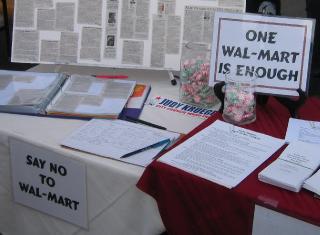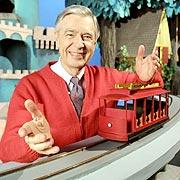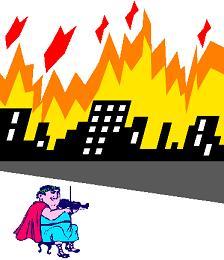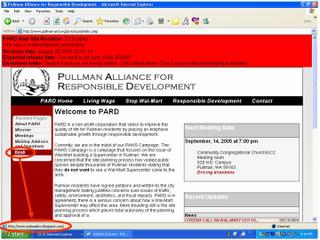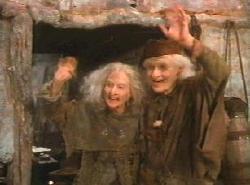6. Each year thousands of tons of oil and heavy metal residue from the huge parking area will run-off into already endangered streams
"Thousands of tons of oil?" Are we talking about a parking lot here or Jed Clampett's front yard? Where is PARD getting this data from?
I love liberals. They never let facts or science stand in the way of their ideology. If it furthers the cause, just go ahead and make something up. The latest example of this silliness: various left-wingers (Cindy Sheehan, Robert Kennedy, Jr., et. al.) are now blaming President Bush for Hurricane Katrina because the U.S. didn't sign the Kyoto Treaty. Riiiiigghhttttt. You don't hear conservatives blaming France (as tempting as that might be) for building a city that is on average 6 feet below sea level in a hurricane-prone area.
Here are some
facts from the Moscow-Pullman Daily News, August 25 edition:
...Wal-Mart's plan for stormwater runoff exceeds the design standards set by the city of Pullman and incorporates standards from the draft Eastern Washington Storm Water Manual being considered for adoption by the state Department of Ecology.
Those standards would require detention of 50 percent of the run-off from a two, 10, or 100 year storm. The city of Pullman requires only detention of of run-off from a 10-year storm.
Wal-Mart has also planned for biofiltration of run-off using grass and swales to remove contaminants from stormwater.
Next.
7. Encroachment on Pullman's historic 19th century cemetery, and noise from trucks using the Fairmount Avenue back entrance to the store
College football season starts tonight. If you're a fan, you probably know encroachment is a penalty when a player crosses the line of scrimmage and makes contact with an opponent before the ball is snapped, or lines up offside and remains there when the ball is put in play. Well, Wal-Mart is not "touching" the cemetery. No graves will be unearthed and none of the trees around the cemetery are going to be cut down. In fact, Wal-Mart is funding an archaeological study to ensure that no unmarked graves that might be present adjacent to the cemetery are disturbed by the construction.
Most U.S. towns have a cemetery that was originally outside the city limits and eventually the city expanded and encircled that cemetery. It's the nature of growth and change. The 19th-century Oddfellows Cemetery on Sunnyside Hill was surrounded years ago, but I never hear any complaints about "encroachment" from the Hawthorn Inn, the city's school bus garage or the Whitman County Fire District station.
In Pullman, we have been "landlocked" for years because of restrictive Whitman County zoning ordinances. The city zoned the proposed Wal-Mart location C-3 23 years ago. The Bishop Boulevard corridor, including the area adjacent to the cemetery, has been the city's designated retail growth area for three decades. No special variance is being made for Wal-Mart. But to change the zoning now would be unconstitutional.
Yesterday, the Cordova Theater in downtown Pullman closed after 77 years. The Cordoav is listed with the National Register of Historic Places but the Pullman City Cemetery is not. Yet, I don't recall any taped mouths or signs when the Village Centre Cinemas were constructed a couple of years ago.
The whole cemetery issue is a red herring that PARD can throw out to keep their opposition from looking ideological.
8. Based on national patterns, local businesses are likely to lose between 47% and 63% of their sales to Wal-Mart, while receiving little if any businesses from those attracted to the "one-stop" store
Again, PARD makes a wildly unsubstantiated claim. Where's the attribution for the percentages? It doesn't matter. Any study they might cite would certainly be from some biased Democratic or pro-labor think tank.
The most empirical evidence of all is what you can see with your own eyes. Take a short drive over to Moscow and see the AmeriHost Inn, Applebees, Staples, Office Depot, Hastings, and Big 5 Sports that have all built in close proximity to the Wal-Mart there. I guess local merchants really aren't losing 47% to 63% of their customers. Downtown Moscow is pretty vibrant. No blight there.
Take a little longer trip to Lewiston and see how many businesses have built around the Wal-Mart there. A pattern begins to emerge. Rather than the economic black hole PARD fantasizes, Wal-Marts are a nexus of retail, dining and entertainment activity.
Shopper behavior and studies debunk the "one-stop" store myth. Who goes over to Moscow and JUST spends money at Wal-Mart? A recent Retail Forward study showed that only 34% of Wal-Mart customers purchased clothing there. The same will apply to groceries, optical, tires, etc.
If Wal-Mart is so destructive to local business, why are the vast majority of businesses in Pullman for a Wal-Mart Supercenter? Because they know they can compete with Wal-Mart by offering better service and different products. Competition is good for everyone. It benefits us the consumer by giving us lower prices, more selection, and better quality. It benefits business by forcing them to become more efficient, productive, and innovative, which ultimately makes them more successful. Most stores in Pullman already serve niche markets that Wal-Mart will not address. Not only can these businesses compete, they know they will thrive because of the increased traffic that Wal-Mart will bring.
Downtown Pullman was hurting long before Wal-Mart announced its plans to come to Pullman. The rejection by Pullman of the Palouse Mall some 30 years ago was a body blow to local business. People DO shop at more than one store, and currently they are doing it over in Moscow. Our local merchants just want to have the same chance to bring in potential customers.
Where was PARD a few years ago when mega-multinational corporation Starbucks came to Pullman and opened up not one but TWO coffee shops in direct competition with the home-grown Daily Grind? It's not about business, it's about politics.
9. Wal-Mart's failure to provide its employees with a living wage and affordable health care will transfer a projected $800,000 a year in social service costs to taxpayers
That $800,000 figure is ludicrous and totally unsupported.
PARD has proposed a "living wage" ordinance for retailers over 75,000 sq. ft. mandating an hourly wage of $9.50 with benefits and $10.50 without benefits. The average hourly wage for regular full-time hourly Wal-Mart employees in Washington is $10.14 per hour. What's the problem then?
Does everyone who works at Wal-Mart make $10.14 an hour or above? No. Does everyone who works at Wal-Mart have fantastic benefits? No again. But most retail and service sector employees in Pullman do not get paid full benefits. Retail stores pay relatively low wages versus other employers. Wal-Mart, like all other retailers, provides a job, not a career. Who believes working there is going to be like working at Microsoft or Boeing? Yet, Wal-Mart often offers jobs to people who have few other employment options or limited education. That sure beats unemployment, which really does transfer social service costs to taxpayers.
The Eastern Washington Partnership Strategic Plan for the Implementation of the Workforce Investment Act of 1998, updated and revised July 26, 2005 by the Workforce Development Council, describes the retail employment situation thusly:
Retail trade is by far the greatest percentage of trade jobs. Average wages can range from $6,500 for employees who are part time to $11,000, even lower than the state average of $16,000. Most jobs are entry level and many are part time. Required training is minimal, and job turnover is high. Retail trade jobs employ college students in Pullman who are willing to work part time while attending school.
No one puts a gun to anyone's head to make them work at Wal-Mart. In the case of Pullman, we already enjoy one of the the lowest unemployment rates in the state. Wal-Mart is going to have to be very competitive to hire 300 full-time workers in this market. Combine that with the fact that Washington has the highest minimum wage in the country, and I think our local workforce will benefit greatly.
The 100 part-time positions will also be greatly welcomed by our student population. Part-time jobs are hard to come by in Pullman for WSU students wishing to work their way through school. Health benefits are not an issue for them, as they covered by the university, or their parents in many cases.
A "living wage" is generally defined a wage sufficient to meet the basic needs of a worker and their dependents, usually a total of four people.
The median age in Pullman is 22.5 and 59.15% of the households are non-family households. Chances are anyone from Pullman working at Wal-Mart is not going to be supporting a family of 4.
The living wage issue is just another diversion.
10. We already have a Wal-Mart 7 miles away, and a new Supercenter is being planned for Moscow
Or, as a PARD poster so eloquently put it: "One Wal-Mart is Enough!"
This has got to be the most arrogant, most idiotic, most illogical, and most childish argument they have yet made.
Let's see, by that same rationale: We already have a Safeway 9 miles away, we already have a multiplex cinema 7 miles away, we already have a university 7 miles away, ad absurdum.
Or even better: "One Starbucks is Enough!"
Who is PARD, or anyone else, to judge how many or what type of businesses we have in our community? See, in America, we have a little concept called free enterprise,that says that private business is free to organize and operate for profit in a competitive system without interference by the government. The alternative is Marxism-Leninism or socialism. I for one don't prefer to have one department store where I have to wait in line 10 hours to buy a pair of shoes that don't fit.
This argument also shows how PARD lacks any kind of real concern for Pullman residents. They would gladly see our tax dollars continue to be exported over the border in the name of their jihad against Wal-Mart. I have gone into extensive detail in previous posts about the revenue crisis the city is facing, so I won't say anything else other than suggesting "we already have a fill-in-the-blank" or "a new fill-in-the-blank is being planned" in another state is shortsighted and disloyal in the extreme. How does having anything in Moscow benefit us in Pullman? Or vice versa for that matter? We're neighbors sure, but we're also competitors. Moscow-Pullman is NOT some big hippie commune or Soviet-style collective farm as some would like to believe. We must look out for own interests the way Moscowans do for theirs.
So, there you have it. Out of 10 chances, not one decent argument against Wal-Mart. That is why PARD's effort is doomed. But as Samuel Johnson once said: "Patriotism is the last refuge of a scoundrel." PARD concluded their Top 10 list with this statement:
Pullman citizens and their elected officials have had virtually no say in the Wal-Mart proposal. Is that any for a democracy to work?
Sure it is, in American democracy. As I said earlier, America was founded on the belief in free enterprise. We don't have elections on whether a business can open in town or not, just like we don't have elections to decide who can live here. If you don't like what Wal-Mart sells or how the building looks or the people that shop there, TOUGH! Don't go there. If enough people feel the way you do, then it will close and go out of business. Wal-Mart is the one taking all the risks with their money, not you. You don't like the businesses in town, go out and open your own. That's what America is all about. It's freedom, baby, yeah!
No, PARD doesn't want democracy, they want an oligarchy of the intelligentsia. These arrogant Brahmins want to shape the town according to their leftist, neo-urbanist tastes. After all, they have PhDs! What do we know? Don't believe me? I'm going to publish some extracts from T.V. Reed's SEPA comments to Mark Workman soon and you can judge for yourself.
Why do PARD members hate Wal-Mart so much? Well, there are too many reasons to go into here. I highly recommend reading
"The Anti-Wal-Mart Jihad" by Butler Shaffer to gain a better insight into what their motives.
Labor unions abhor Wal-Mart because it has managed to succeed without them. Many of Wal-Mart's competitors despise it because they are lazy. Some Americans don't like bigness. Pure raw capitalism seems to disturb some people. There is nobody bigger or more capitalistic than Wal-Mart.
Liberals loath Wal-Mart's conservative, family-oriented policy of censoring some books, music and movies. They also resent Wal-Mart's big political contributions to conservative Republican political candidates. As one writer put it: "Wal-Mart stands out as a company in the old style - one that plays the capitalist game with enthusiasm, while still espousing values that Christian Americans hold dear." You see how that plays out in ultra-PC modern America. Stopping a Wal-Mart is almost as good as voting Dubya out of the White House.
A lot of opposition, frankly, is based on snobbery. There are those who think Wal-Mart is "ugly" and filled with overweight working class people with their old trucks and SUVs, NASCAR caps, spandex pants, and bawling, snot-nosed kids. Yet these are the same people the liberals say they are supporting. All they are really for is big government regulation of business and social engineering.
And a certain amount of resistance to Wal-Mart is based on nostalgia. These are the people that long for the days of the old five-and-dime store with the soda fountain and penny gumball machines. Times change, and so do people. Retailing has evolved from the shops on Main Street to shopping malls to big-box stores and now to eBay and Internet e-tailers. The businesses that succeed are the ones that learn to adapt to their customer's changing desires and expectations.

